(A version of this piece was originally posted on my blog at reginadoman.com but as I doubt few people found it, I’m posting it here.
As an author of fiction, I never thought my particular personality or life experiences were important enough to speak about in my fiction. I prefer to hide behind the curtains of plot, character, and theme, like any good theater director. However, as I move forward into shoving these Culture Recovery Journals off the dock and into the waters of public, it seems important to better articulate my perspective. That is the first reason for this autobiographical reflection. The second reason is more reactive. Some of my fellow writers were explaining on Substack how they had come to lose their childhood faith, and so I was moved to write down something that explained to myself and them why I hadn’t. The result is what you are reading.)
For a long time I've been silent on my blog, on social media, and most importantly, on the bookpress. There have been many reasons, which can generally be categorized by the tiresome category of aging. I am older, past fifty, and while I never particularly wanted to stay young - my youth was incredibly happy, especially by comparison with the lives of so many others - I do miss having energy and focus. But largely my growing-up years were punctuated by small miseries of emptiness and frustration, miseries which largely dissipated with the freedom that comes from being an adult. I am grateful for youth: I am happy to let it pass down the stream, having gone through it and seen it pass by. I don't really wish it to return. But it seems worthwhile at this juncture to take a look back.
Unlike so many Gen Xers, as a youth, I became aware of the major sins of the age without participating in any of them. I never smoked a joint, sneaked a drink, or tried to figure out how much I could "get away with" without crossing "the line," as Catholics used to say. You may think I was insufferably good or tame, but I wasn't particularly. I was too lazy and self-absorbed to be good. And I don't think I was tame. From childhood I wrote and staged plays and shows for my family and friends; as a teenager, I wore what would now be called vintage fashion without shame; I laughed long and hard with friends, planned and executed elaborate practical jokes, jumped in city fountains, sang Broadway songs in public places, and overall had far more fun than one would think possible without straying into those dark and sinister clouds hovering over the young at the close of the twentieth century. My friends and I used to say we couldn't afford to drink: we were crazy enough while sober.

I was, however, always a bit of the hard-nosed Pharisee. One aspect of the Pharisees which most of us forget is that they were mostly correct in their lifestyle choices: they were just incredibly proud of being right, and lost their souls because of it. If you are graced enough to not have fallen into the habitual sins of the age, not being a Pharisee is a good life goal to have. I am a reformed one, and must always be wary of sinking back into that danger.
As a child, I was devout without being pious: I didn't particularly like rote prayers or kneeling or little devotions, but I loved God expansively and much preferred the quiet of empty church buildings, the smell of worn pages of a Bible, and the resonance of hymns shouted to the sky to the cheap plastic toys, rock n' roll, lipstick, motorcycles, or the desaturated despair of movies in the 70s.
The 1970s was a horrible time to be an artistic child. Frizzy hair, deliberately shoddy fashions, screaming, and artistic sloppiness in everything from art in museums to poorly printed children's books to the creaking animation of Hanna Barbera's Saturday morning cartoons. Even Disney, one of the few bright lights of joy and wonder, was going through their pencil-scribble animation phase which made their pictures jitter in an anxious way. Everything seemed ugly to me, and I hated it without knowing why. The glimpses I caught of the "top" works of the age - the horrible Clockwork Orange, Stephen King's oeuvre, the exaggerated Satanism of KISS and the Bee Gees' minor key whining, hit movies like Saturday Night Fever, The Godfather - reinforced the sense that life was dangerous, chaotic, demonic, and despairing. I came to have an irrational fear of the large wooden television set in the living room that brought these images to my imagination. To these, there was no answer.
Where was the contrast? Ironically, I found it in my 1970s parish church. My parents had joined our parish's charismatic prayer group which met in the basement church after hours (my parish had an upper and a lower church, the lower church being less ornate). I begged to go to these prayer meetings where I would happily sing, listen, and draw on my art pad to my heart's content. There I could draw what was not scary: animals, houses, trees, and the intricate image of the Holy Spirit, each of His feathers fanned out as He brought down fire upon the earth. That image I copied again and again from a felt banner that hung in the sanctuary, one with rare beauty crafted by some truly talented artisan who cut each felt piece expertly and picked out the details in curling thin gold braid.
Our neoclassical parish basement church had been whitewashed by some enthusiastic pastor in the 60s, but our new pastor reintroduced judicious color, a strong yellow gold, and put in simple golden stained glass which had a dazzling effect upon my very young imagination. I absorbed the lesson: something sinister had come along to erase tradition and destroy anything true, good, and beautiful, but some of us were quietly and silently fighting back, at night and in the dark where no one noticed. To me, the prayer meetings had the thrill of resistance meetings, but happier and more hopeful, full of a careless joy in Christ. I have always preferred that to the gritted teeth and hardened resolution of other counter-cultural movements of the time, such as conservatism and traditionalist Catholicism, movements which I over time I have entered into strategic alliance and friendship with.

Mine was not an intellectual faith but a sensual one, in the child's sense: I felt safe and at home with God, and scared and nervous when I wasn't. Looking back, I'm not inclined to see it as a virtue, but as a very real gift. If there was any virtue involved, it was the virtue of my parents. They had come to a renewed Catholic faith as a couple around the time I was born and were taking those serious steps that seem small at the time but chart a course for a lifetime.
One key decision, which I didn't learn about until years later, was the flap of a trash can. Through soul-searching and grace, they had realized that Pope Paul VI was right and all their fashionably intellectual Catholic friends were wrong regarding birth control. Their decision to toss the diaphragm in the trash and commit the size of their family to God sent silent reverberations of joyful adventure throughout my childhood. I never remember my parents even discussing contraception with anyone, let alone me or my siblings. They didn't need to.
That crucial Catholic dissent against Humanae Vitae, that rebellion which poisoned and enfeebled pastoral authority, made parish life dishonest, split neighbors, families, and every Catholic institution from grade schools to youth groups, from retreat houses to religious orders was just a small hairline crack at that point. The weeds were snaking their way in with feathery tentacles, but most of us did not notice them. My parents, their silent joint decision uniting them like a rock, always did. Their spiritual clarity throughout the storms rolling in against the Church during those years is remarkable.
As the oldest child, I felt very close to my parents and inevitably found myself on the same side of the table as them on any issue. My parents were just a little too old and married just a little too young to really be part of the "baby boomer" ethos. I retained their feeling of being on the margins, with the corresponding felt freedom to pick a different path from everyone else in society with no guilt or shame over being the odd one out. (And I've continued on that hybrid trail: my husband is technically a Boomer and we married young compared to our peers, so that unique vantage point continues.)
I loved my parents: my dad was a Vietnam vet who loved us kids more than anything else except his lovely wife and God. And my mom, brilliant, articulate, and stylish, was always too tough and on task to bother with feminism. Both of them were in science: my dad was a components engineer and my mom was an adjunct in higher math, but they loved the arts and books and their Catholic faith. They filled my childhood home with brothers and sisters and relatives and lots of adopted family. They collected stray people like others collect stray animals: singles far from home, the lonely elderly, single moms, handicapped or sick parishioners, young families struggling to make ends meet, artists, musicians: anyone they met whose disability or temperament or circumstances had pushed them out of the mainstream— usually ended up at our kitchen or dining room table.
Oddly enough, I emerged into the world and consciousness with some things settled: I knew I was an artist, of uncertain talent, but that was my vocation, and I needed to follow it, and that I was meant to find someone to marry. I was sluggish and socially awkward, slow to make friends, and fairly self-absorbed. To this day, I seldom struggle with guilt or doubt and have the ability to compartmentalize fairly well. Moving forward is my natural bent, and I rarely look back or notice the past (which is why I seldom write this sort of piece). You can imagine this makes me difficult to live with. Fortunately, my younger siblings had strong objections to putting up with someone like me, so I learned, like most members of large families do, to become more self-aware, to be humiliated into stopping bad habits, to protect myself by becoming less clueless (this was a dangerous time to be a kid, let alone someone with their head in the clouds), and to occasionally pay attention to the brother or sister shouting in my face that I was burning dinner.
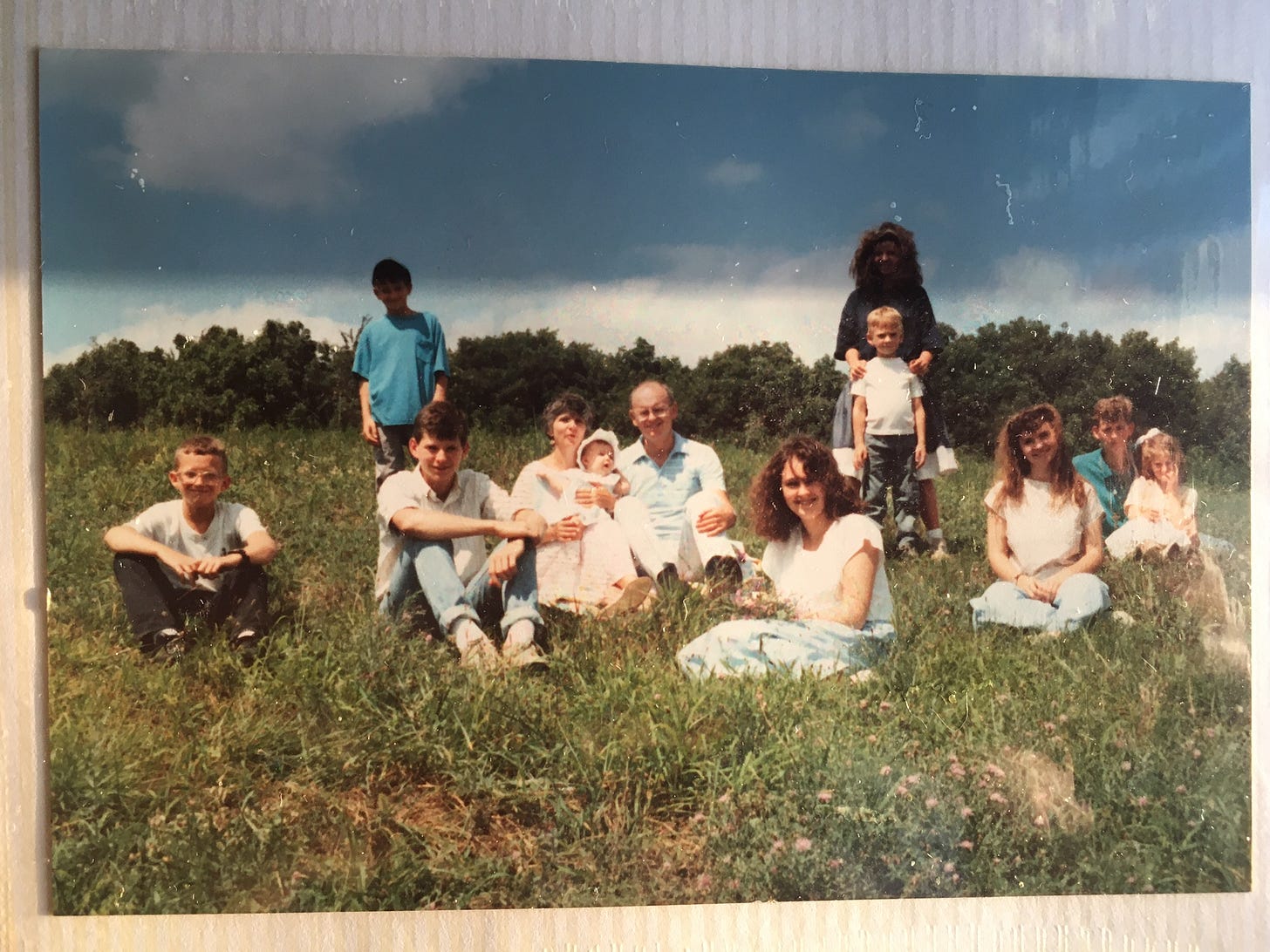
Now that I am past fifty, I ponder nostalgia. I don't really miss my childhood home, although it was happy. I thought most of the houses I visited were unpleasant and never really wanted to own any of them, although I loved the people who lived in them. What I really wanted was a palace or a thatched cottage in Narnia, but I was sensible enough to recognize I would be lost without indoor plumbing. I still think it a stroke of brilliance on Tolkien's part that Frodo's cottage at Crick Hollow anachronistically contained a magnificent set of bathing tubs.
But from the point of view of interior decorating, I resented the ugly shoddiness of almost everything I encountered. I grew up near Philadelphia, and when my parent's habit of collecting people eventually brought us into contact with people who had more disposable income, I sometimes saw glimpses of truly good architecture, but even then, something was always wrong. The color, or the landscaping, or the positioning of the buildings was awkward and bothered me. In my high school years, it was discovering the neighborhoods of Philadelphia's Main Line that brought peace to my soul: houses of stone and wood, well-proportioned and welcoming, nearly mythopoeic in their atmosphere. Not just the neighborhoods of the incredibly wealthy, either. Some of my happiest memories were of walking through middle-class neighborhoods of original Arts and Crafts houses, my heart singing with happiness as I edged down narrow cracked concrete sidewalks between lines of awkwardly parked cars, admiring rough brickwork, golden plaster, expansive porches, well-trimmed rooflines. It's interesting that my first love of buildings happened in the city.
Now I live in a place I actually love - Virginia - in a home I actually love, the Black Cat Inn at Shirefeld, as we have dubbed it. It was originally a railway worker's home turned farmhouse, and my husband and I renovated it back when we had youth, energy, and more money. It lacks the squat Craftsman proportions I love, and is more vertical, in the Southern style to accommodate the heat, but thanks to help from my invaluable in-laws who helped us design and renovate it, it is almost as good as a cottage in Narnia.
All that's best in life meets me there, including the perennial seduction of reading books (or articles on my phone) by the fire in the woodstove with a hot pot of tea always at hand. Like Bilbo at Rivendell, I would snooze there forever, never finishing writing my stories, though always with the best of intentions.
When a child goes adventuring, he selects a few things - a teddy bear, an apple, a sword, and holds onto them fiercely. They grow larger and more central for the selection. So I will select a few things for this adventure going forward, and will enumerate them thusly. I have emerged into the second half of my life still holding on to my treasure trove: my faith. The man I love. My family. The inn of my home.
I recognize that my life has been easier for the clinging to God, and for the ordering of my life under religion. It was wise of me, though I did not recognize it at the time, that I should have set out with my faith at the foremost of my choices. Following the laws of God, as difficult as that is for the artist and the rebel in me, has brought me the blessings of God in the very fabric of my life. I mean those small almost insignificant moments of prayer or obedience that over time multiplied by the thousands translate into the habit of a peaceful mind, friendships, affection from others, the prospering of the work of one's hands. I have no broken windows in my soul to constantly tape over, no skewed perspectives to mentally correct, none of the horrific losses of divorce or estrangement or the nagging guilt of papered-over sins. It wasn't wisdom on my part: simply obedience and for that, I have to point to grace I didn't deserve. I pray it continues, and that I can be faithful.
Setting out to wait for a Catholic husband to show up with all the vehemence of forging forth into a forest was the second of the right choices I blundered into. I prayed for a man who was more devout than I was, because I didn't want to be the pious wife haranguing her husband into prayer. And God sent me one, in His good time. Clinging to my husband through the storms of tragedy and loss of children was the third incredibly wise choice I was blind enough to make. How he has put up with me and my faults I will never understand. He has everything I love best in a man: irascible teasing, logic balanced with passion, strength and devotion to Christ, and an industriousness that balances my laziness and a practical foresight that astonishes me with its simplicity. Plus he's still pretty easy on the eyes. One doesn't expect to find a handsome husband when one is a bookish and religious fraulein, and in that regard, God has been good to me indeed.
Having children with the generosity learned from my parents and in-laws, which cut against my natural selfishness, was the next wise thing. If one has a house, one should fill it with as many children as possible. What else does one do with a house? Dust it? Use silver, and you won't have to polish it. Fill up a house with children, and they'll keep the dust airborne for you on most days.
I do love my children. Like my own mother, I was never a woman who needed or hungered for children, and I very seldom have felt motherly, and seldom felt guilty about not feeling it. But kids are great. One result of religion is that I have learned to love people and my children are people I love, and they have been interesting and entertaining and so much fun to have around.
I will mention that my husband and I have always been rather artistically poor and really could not afford to have any of our children. Especially my oldest, who was born when we were literally living in a garret apartment with a part-time income of five dollars an hour. My last babies were born when we were in danger of losing our house since our respective incomes had dropped so steeply. Each of the ten was brought into the world in the midst of some sort of financial burden or catastrophe: no insurance, no ability to pay the midwife or the hospital, struggling with medical bills for an existing child, or living in a half-built house with no insulation. But the children came, and God provided. The job or the raise or the money to pay the bills or the construction help appeared. We would have been foolish to have traded a little fleeting financial stability for this precious and irretrievable time with these incredible immortal souls we call our ten children. There may be reasons for putting off pregnancy, but we haven't discovered them yet. Because we didn't wait, we were able to give our children our youth, our energy, our time to make mistakes and figure out parenting, and our passionate enjoyment.
And each baby became more precious. I remember feeling burdened by my first babies as I carried them around in slings and backpacks, itching to put them down so I could use both hands again. But when I had my last child at the age of 46 after several miscarriages, I could not put her down! I carried her everywhere, a bouquet of sweet-smelling baby I could not stop nuzzling. "Is this your first?" kind strangers would inquire. "Thank you: I must look young," I would say. "It's my tenth."
When I was a younger woman, I admit that although I was fine with giving children room in my body, I used to fret about the mental space my children would take up in my mind and heart, and visualized a future of worrying over and fearing for them. I admit that losing a child did not make these worries or fears less. But now I do find a freedom of mind, a resignation to suffering, and a meaningfulness in that mother's suffering which is tinged with a subtle and mysterious sweetness. I have done and am doing my part in continuing the human race. I have made the man I love a father. I have brought forth children. Feminists, say what you will: that's not nothing.
What I don't really quite know if I've managed to bring with me into the second part of my life is my art. My raging artistic fire has cooled: I no longer pant and thirst for beauty, no longer wake sleepless because of the visions coursing through my brain. I should like to find my passion again, as inconvenient as it makes life. Am I too afraid of the pain? The risk? To plunge naked into the freezing torrent of humiliation and emptiness and fear?
Have I got what it takes? Now that I'm a pudgy older woman, of the sort that populates parishes, the very backbone of the church, I find myself part of the crowd, more of the average, not the odd teenager attending daily Mass amidst a sea of gray hair. I am part of the contingent of the infamous church ladies now, and my presence at Mass is not so unusual. I am an acceptable and worrisome part of the construction of the church visible, a dependable stone, either obstacle or building block, depending on where I happen to be dallying at the moment.
But this is not bad, I have come to see. It is good to be part of something, to be useful, to help others more easily and with less effort. When one is a child, helping others is hard: you can only do so much and quickly empty your resources. But right now I am at the top of the slope. Going down, I will descend into another childhood: more effort, less easily, and knowing one can only do so much in the end.
What do I have to bring, going forward? And how much time is left for me?
To be known by the saints and by the church suffering was something that I ironically learned when I lost my son Joshua. At the age of almost five, I have no doubt that he soared immediately to heaven. And he has continued to make his presence known in our family through surprise acts of kindness. I suppose I should explain.
My great-grandmother had a devotion to St. Anthony, that finder of lost things, and I have picked it up where she left off. Anthony is my friend, and I love him for his devotion to the Scriptures and his desire to remain in the background. I treasure his vision of the Christ Child Who is said to have embraced him, thanking Anthony for preaching about Him so well. Here is one sign that assists my faith: since he died, Joshua seems to be hanging out with St. Anthony, so much so that his particular gift to our family and friends is finding their lost objects. In our home, we tell children who have lost their shoes or their books or a part of some tool or toy to "ask Joshua," and inevitably he comes through for them.
To me, this is a small reminder that Heaven is real and that its life can permeate our broken and dismal life, if only we let it. When we bought our house, I painted on the steps to the upstairs these lines from a medieval poem: "No heaven can come to us unless our hearts find rest in it today. Take heaven."
Perhaps that is why I'm not nostalgic, even post-fifty. The best is yet to come, if only we make it there. As they say, adventure awaits and is ongoing.
Maybe, for me, it actually will involve writing another book. For that and for everything, I crave your prayers.





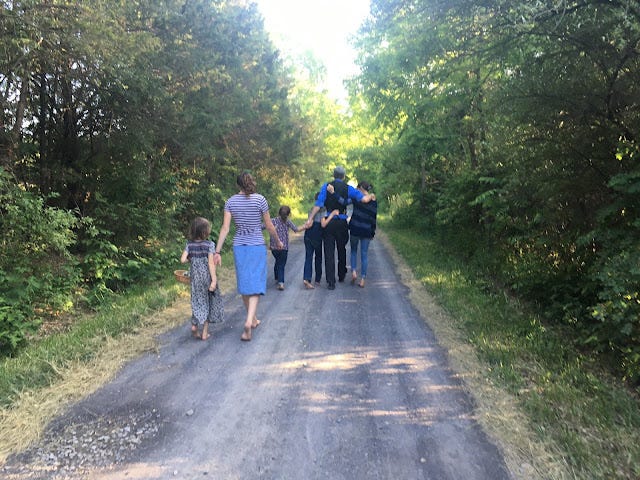
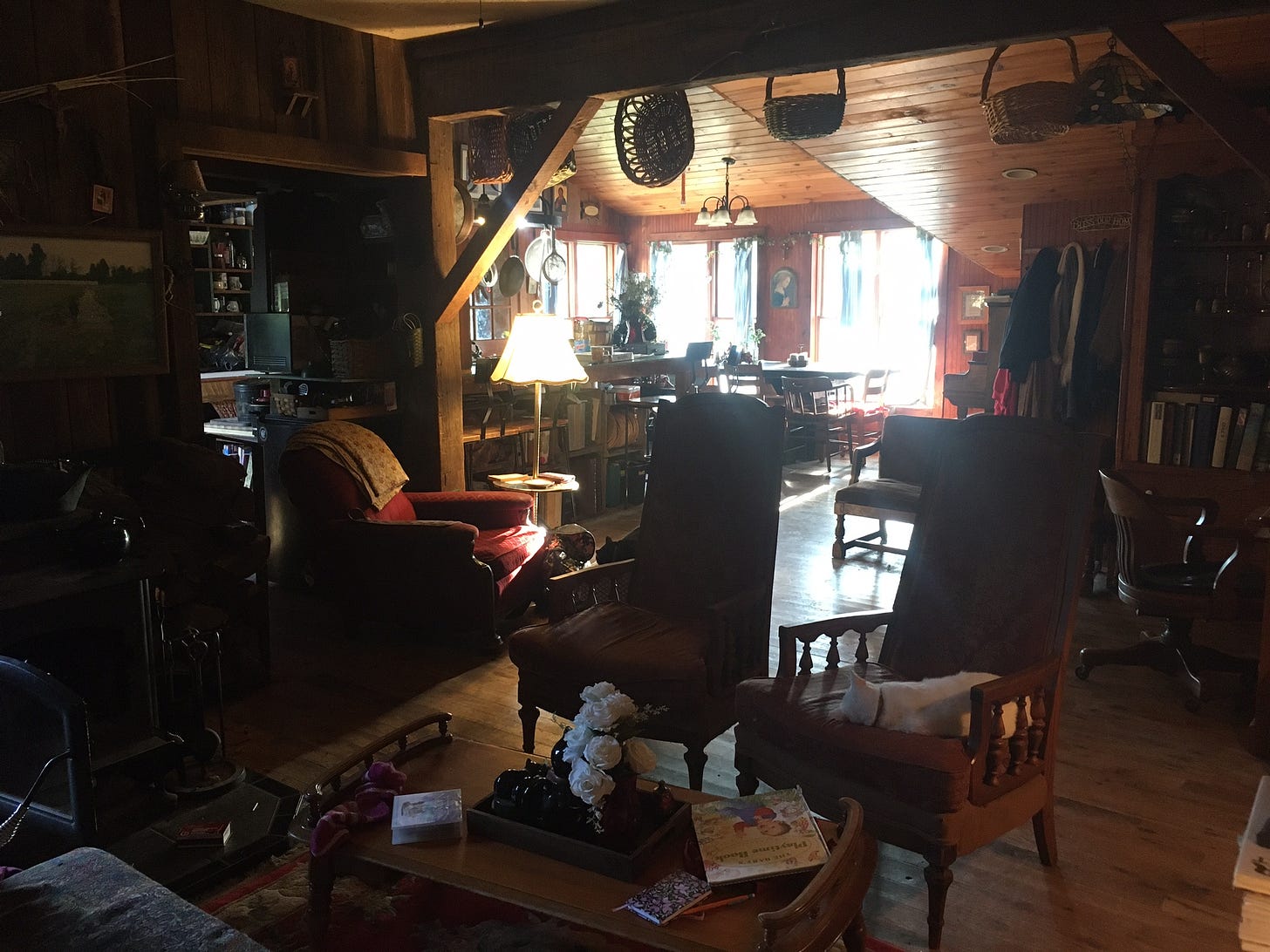

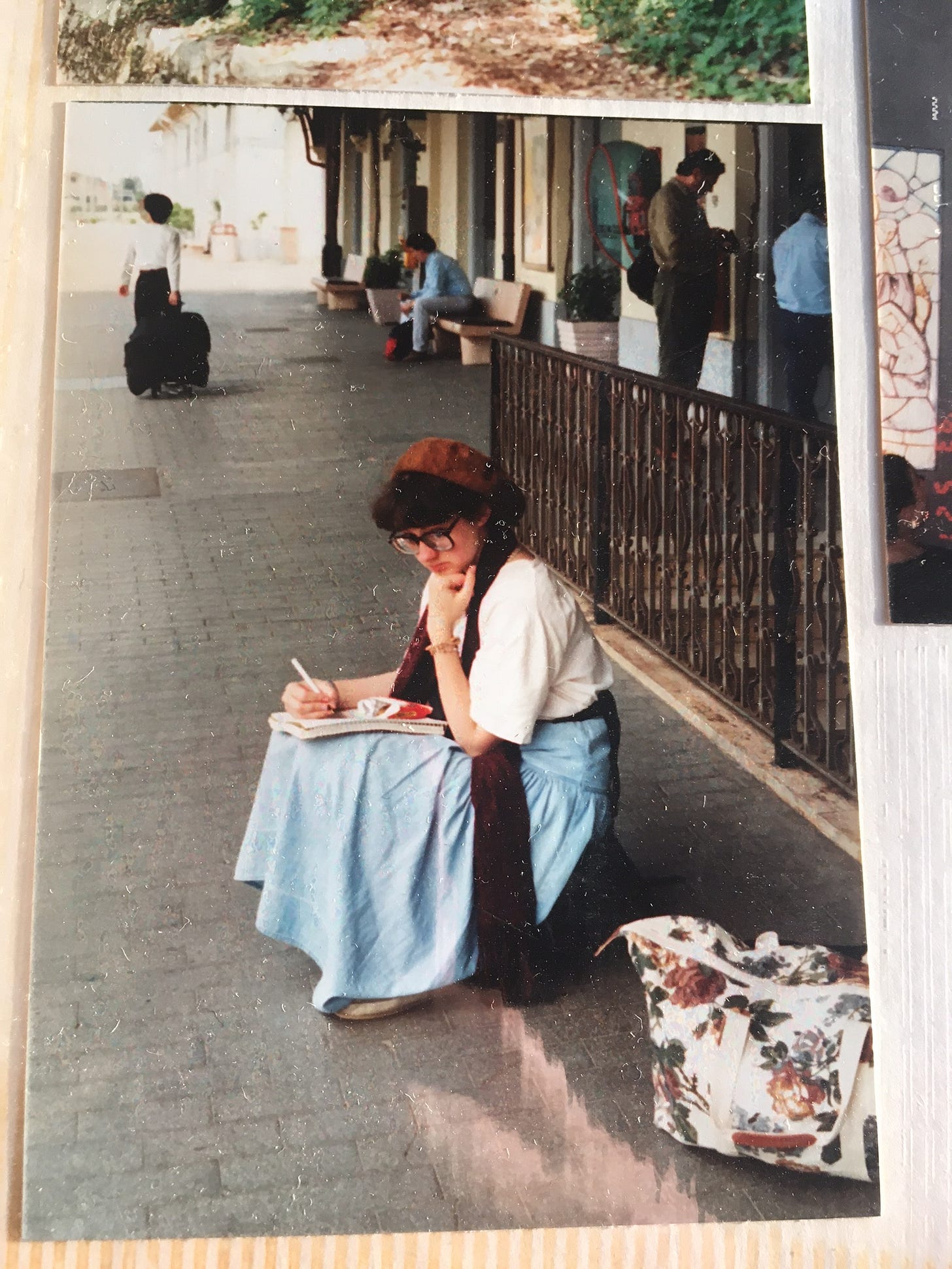
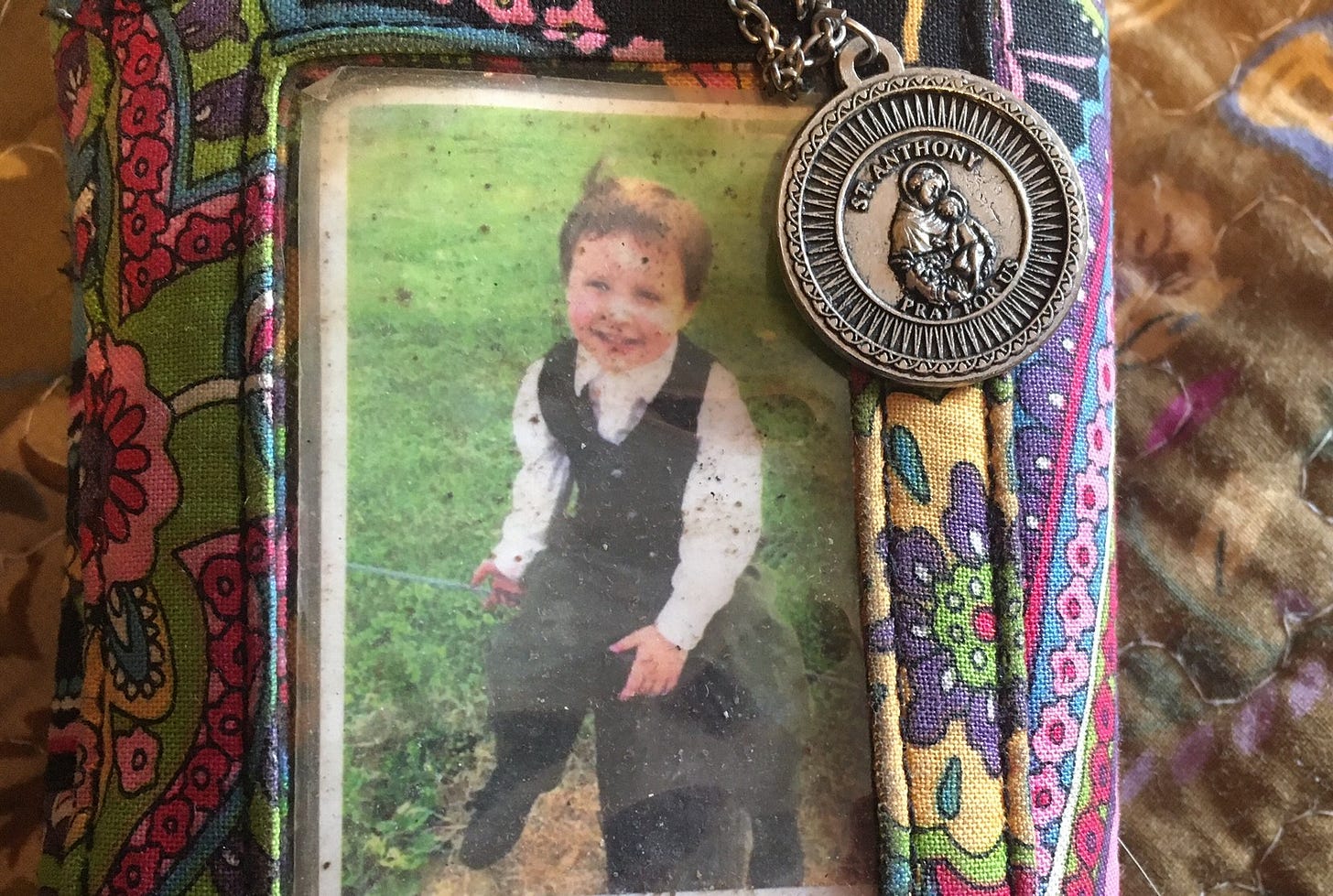
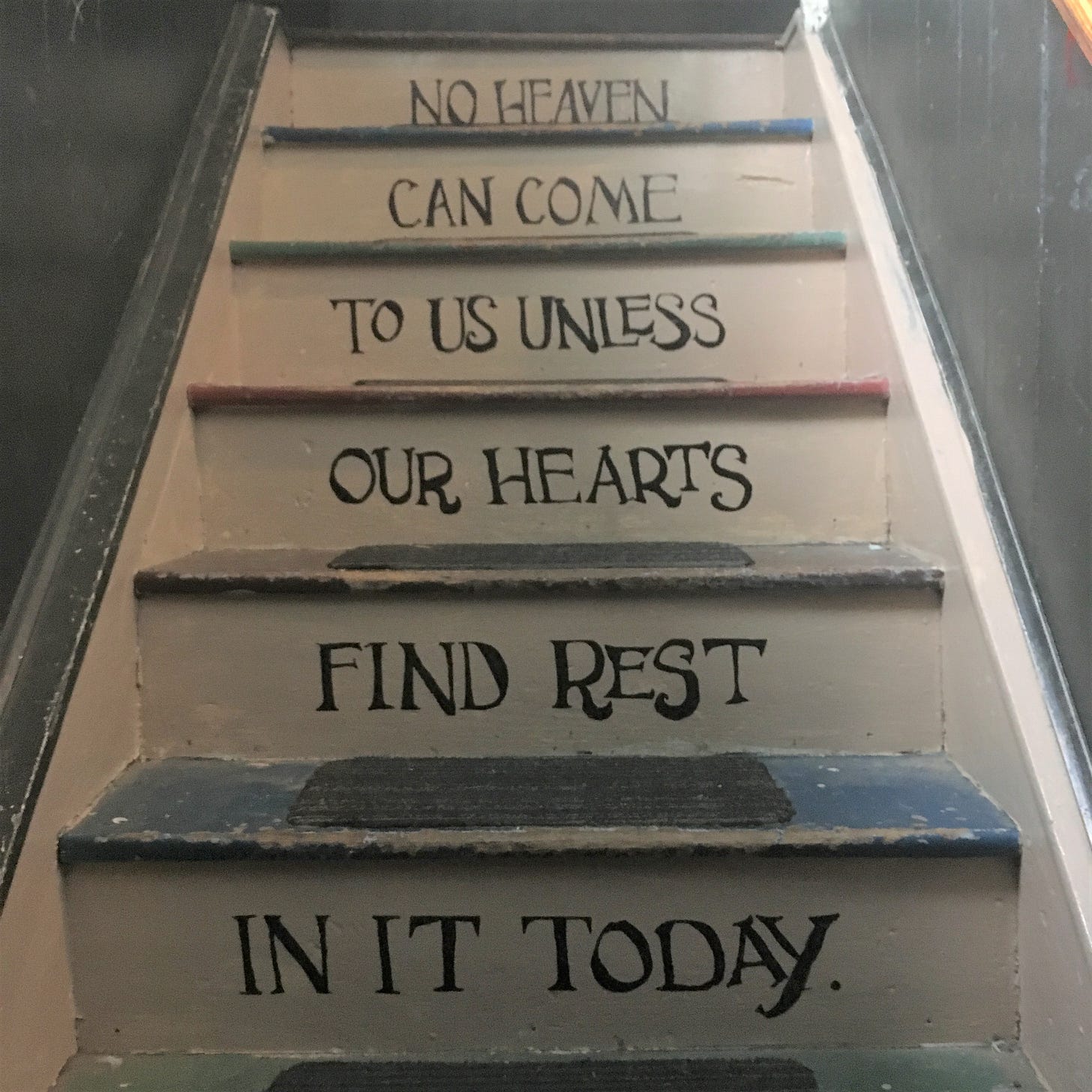
Absolutely beautiful. And not just because you are my sister. I was spellbound reading this. You have a gift. Don’t stop writing. I’m listening.
I love this Regina.